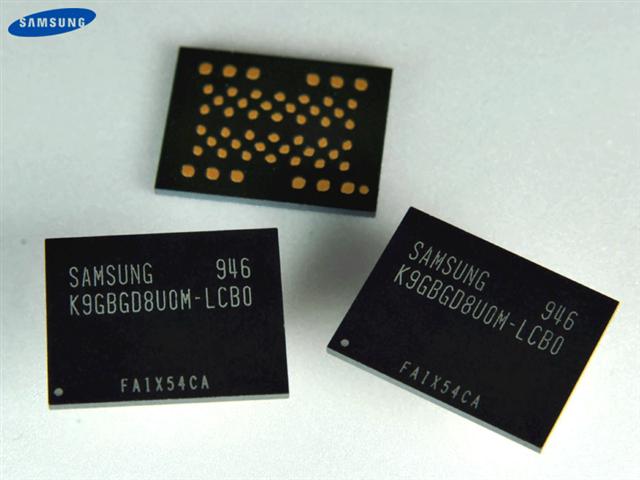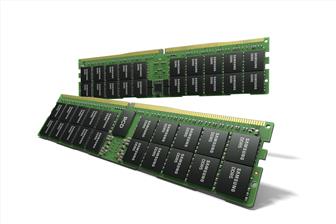
Samsung Electronics has kicked off mass production of its 30nm-class, 32Gb, multi-level-cell (MLC) NAND memory with an asynchronous DDR interface. The company began shipping initial production of its DDR NAND to major OEMs at the end of November.
DDR NAND will sharply raise the read performance of mobile devices requiring high-speeds and large amounts of storage space. Samsung said its new DDR MLC NAND chip, which reads at 133Mbps, would replace single data rate (SDR) MLC NAND that features an overall read performance of 40Mbps.
Samsung's new asynchronous DDR MLC NAND can be used in SSDs for PCs, premium SD memory cards for smartphones, and in Samsung's proprietary moviNAND memory, according to the company. The high-density memory is also an ideal solution for personal media players (PMPs), MP3 players and car navigation systems, the company claimed.

Samsung HKMG DDR5
Samsung Electronics has expanded its DDR5 DRAM memory portfolio with a 512GB DDR5 module...
Photo: Company

Nvidia GeForce RTX 30 series GPUs
Nvidia's GeForce RTX 30 series GPUs are powered by the company's Ampere architecture. The...
Photo: Company

Apple HomePod mini
Apple's HomePod mini is the newest addition to the HomePod family. At just 3.3 inches tall,...
Photo: Company

Apple 13-inch MacBook Pro with Magic Keyboard
Apple has updated the 13-inch MacBook Pro with the new Magic Keyboard for an improved typing...
Photo: Company

Apple iPad Pros
Apple's new iPad Pros comes with the latest A12Z Bionic chip, an ultra-wide camera, studio-quality...
Photo: Company
- South Korean president declares martial law (Dec 3) - The Financial Times
- China dials up US trade tension with tit-for-tat metals ban (Dec 3) - Bloomberg
- Silicon photonics set for takeoff (Oct 30) - EE Times
- TikTok founder becomes China's richest man (Nov 1) - BBC News
- Nvidia to take Intel's spot on Dow Jones Industrial Average (Nov 1) - Reuters
- Huawei's latest AI processors were made by TSMC (Oct 22) - Bloomberg
- Arm to scrap Qualcomm chip design license in feud escalation (Oct 23) - Bloomberg
- Embedded World brings 3,500 visitors to 1st US outing (Oct 11) - EE Times
![]() South Korea's FuriosaAI takes on global AI chip race with 'RNGD'
South Korea's FuriosaAI takes on global AI chip race with 'RNGD'FuriosaAI, a Seoul-based AI chip startup founded in 2017, is making waves in the AI hardware market...
![]() TASTI 2024
TASTI 2024From groundbreaking satellite advancements to international collaboration on space exploration, DIGITIMES Asia delivers comprehensive coverage of TASTI...

CSP in-house development of ASIC accelerators
Google TPUs will see a share of over 70% in the in-house developed cloud ASIC accelerator market in 2024; an all-optical network...

AI chip market outlook 2023-2028: Insights from demand and supply perspectives
The growing demand for AI computational power is accelerating advancements in hardware and chip technology, necessitating innovation...

Automotive CIS tech development, 2024
The popularization of autonomous driving is boosting demand for automotive CIS with LFM and HDR being mainstream development...






